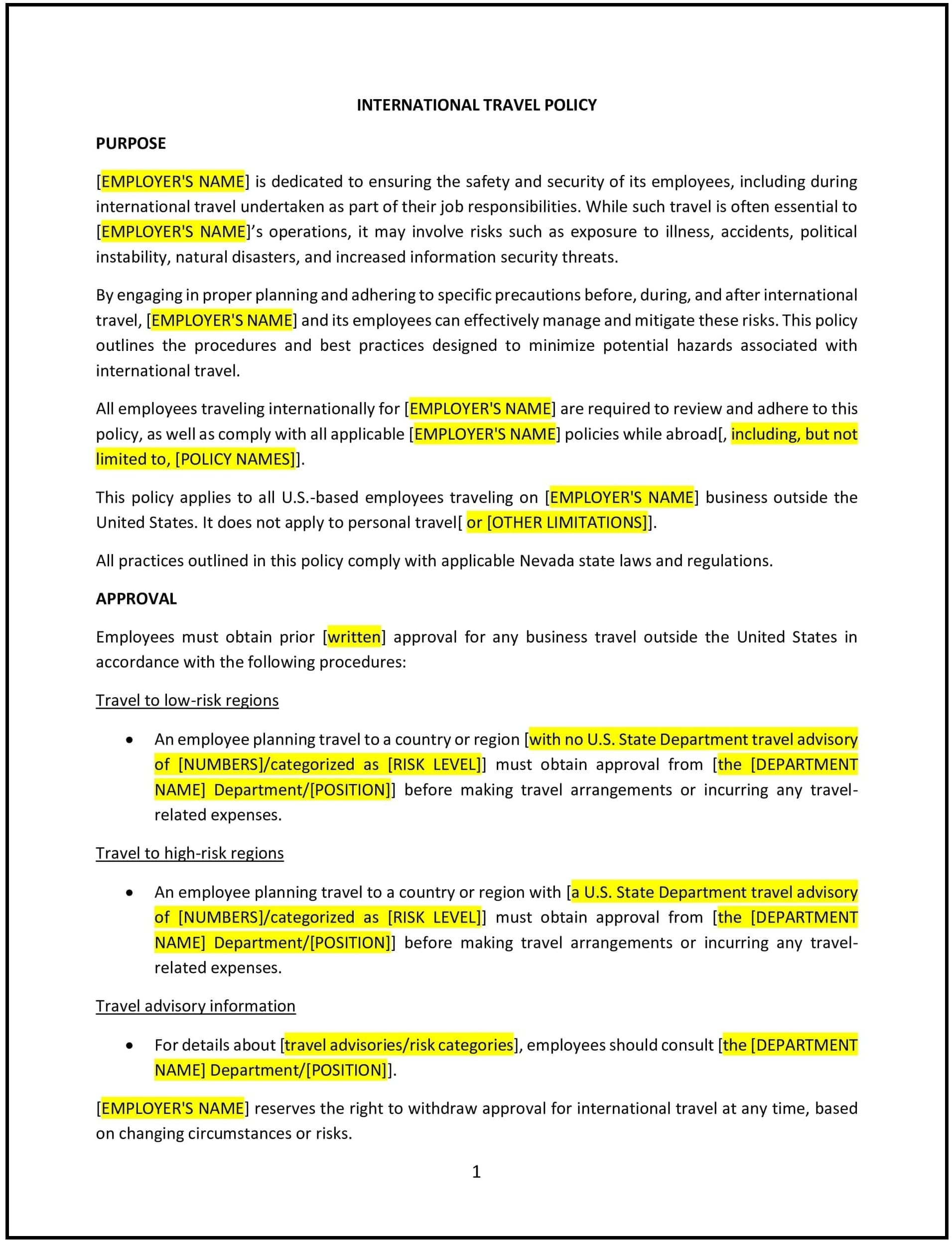International travel policy (Nevada): Free template
Got contracts to review? While you're here for policies, let Cobrief make contract review effortless—start your free review now.

Customize this template for free
International travel policy (Nevada)
This international travel policy is designed to help Nevada businesses manage work-related travel outside the United States. It provides guidelines for ensuring employee safety, controlling costs, and maintaining compliance with company procedures and applicable travel regulations.
By adopting this policy, businesses can streamline international travel processes, reduce risks, and ensure consistency in how travel is managed.
How to use this international travel policy (Nevada)
- Define travel approval procedures: Specify the steps employees must follow to obtain approval for international travel, including submitting itineraries and budgets for review.
- Establish expense guidelines: Outline reimbursable expenses, including airfare, lodging, meals, and transportation, as well as limits for each category.
- Address travel safety: Provide employees with information on health, safety, and security considerations for international destinations. Encourage registration with government travel advisory programs, such as the U.S. Department of State’s STEP.
- Clarify visa and documentation requirements: Specify employee responsibilities for obtaining necessary visas, passports, and other travel documents, and outline the company’s role in supporting this process.
- Set communication expectations: Require employees to remain reachable during international travel and provide instructions for reporting emergencies or travel disruptions.
- Provide pre-travel briefings: Offer briefings on cultural norms, business etiquette, and any destination-specific policies or risks employees should be aware of.
- Address insurance coverage: Outline the company’s travel insurance policy, including what is covered (e.g., medical emergencies, lost baggage, trip cancellations) and how employees can access support if needed.
- Review compliance requirements: Ensure adherence to international travel laws and company-specific policies, including data security protocols for traveling with company devices.
Benefits of using this international travel policy (Nevada)
This policy provides several benefits for Nevada businesses:
- Ensures employee safety: Provides guidelines to protect employees while traveling abroad, reducing risks associated with international travel.
- Manages costs effectively: Establishes clear expense guidelines to control travel costs and prevent overspending.
- Promotes consistency: Standardizes how international travel is planned, approved, and managed across the organization.
- Enhances compliance: Helps employees meet visa, documentation, and legal requirements for travel, avoiding potential disruptions.
- Improves efficiency: Streamlines travel processes, saving time for both employees and administrators.
Tips for using this international travel policy (Nevada)
- Communicate the policy: Share the policy with employees before any international travel is planned, ensuring they understand the procedures and expectations.
- Provide travel resources: Offer tools or platforms for booking travel, tracking expenses, or accessing emergency assistance while abroad.
- Monitor travel conditions: Stay updated on travel advisories, health alerts, and other risks in international destinations and provide timely updates to employees.
- Review expenses carefully: Ensure employees submit receipts and adhere to expense guidelines for prompt and accurate reimbursements.
- Update regularly: Periodically review the policy to address changes in international travel regulations, company needs, or emerging risks.